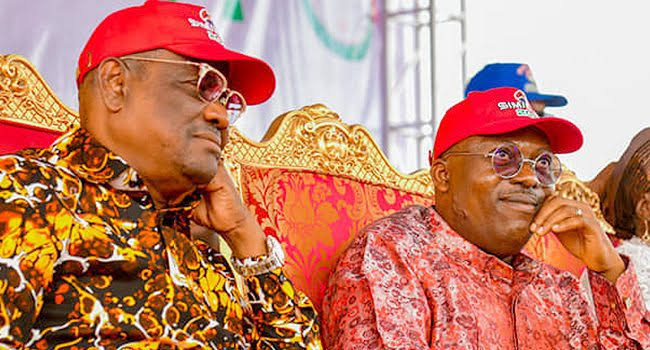Rivers state has started again. This time around, the riverine state is not supplying fuel to the country but political troubles. It doesn’t matter how good their relationship was before—there is always a vicious struggle in the state between predecessor and successor.
It was nothing less than decent for Wike and Amaechi to struggle for power during the 2015 elections. In the 2015 presidential contest, Amaechi backed Buhari while Wike backed Jonathan. In the end, Wike was appointed governor and Buhari was elected president. Amaechi’s main lieutenant, Wike, became his fiercest adversary. On Wike and Fubara’s case as well, the same nasty fight that turned Wike and his former boss, Amaechi into arch-enemies is going on.
The governor of Rivers State is Siminalayi Fubara. He was an employee who worked his way up to become the state’s accountant general. Many politicians expressed interest in the position of governor, but Wike disregarded them. Fubara was chosen by him alone, and after shoving him down everyone’s throats to win the candidacy, he installed him as a governor.
It’s likely that Wike believed he needed an inexperienced, non-political actor to take over as governor in the event he wanted to leave the state, but he was also afraid. Wike appointed his protégé to the position of Speaker of the State Assembly. He requested that Fubara name a different political scion to serve as Chief of Staff. Although he believed he had sealed Fubara’s political fate, Wike himself gave the governorship he held for eight years too little credit.
A governor is a demi-god in Nigeria. They give commands as they please and talk with fury. They continue to enslave other branches of government even when they run for office. They are preparing to seize control of the state assembly while they scramble for votes. The governor has the authority to arrange for the speaker’s impeachment as well as to suspend the Chief Judge. Other organs were sold out by the constitution that established the president and governors as the head of government. It destroys others’ independence, turning the chief executive into a roadblock to the system’s advancement.
In my opinion, Nyesome Wike should be reimbursed by his group of so-called prophets and seers for selecting Fubara above hundreds of applicants for the significant position. Wike’s worst error was believing he could just throw an educated man who became the Accountant General around like a piece of luck. The governor’s office has a great deal of authority. It is only possible for a dummy to rise to the position of governor and remain subject to family dictates or toss-up decisions.
The traditional Yoruba game “Talo ga ju laba?” that I grew up admiring came to me when I watched a video showing the Rivers Governor, Fubara, and his supporters being tear-gassed at the assembly complex. Ta lo ga ju laba? would be the chorus that we would begin singing after randomly lining up, standing on our toes, and singing ‘Emi ga ju laba. Ta lo kuru ju laba? Emi kuro ju laba’. We sing along while dancing about on our tiptoes until one of us gets tired and leaves the scene. When someone is resilient, even someone who is shorter than them may stay longer than someone who is considerably taller.
The bloody struggle has begun. Realignment and alignment will occur. There will also be transitions. Wike may defect to the All Progressives Congress (APC), which is now in power, as a registered member. The governor might have support from people like Amaechi and irate APC chieftains who view Wike as an intruder. A Yoruba game called “Ta lo ga ju laba?” has started between Wike and Fubara. The game interests us as spectators. Would Wike win this match as an FCT minister? That is what we want to know.
Remember that Wike had also participated in the game against Rotimi Amaechi. Wike had to betray Amaechi’s spirit of resiliency as he stood on tiptoe, panting for air. Wike overcame Amaechi, won the governorship twice, and even appointed a successor. Amaechi let out a long cry. He described how, among other things, he assisted Wike in moving up the political ladder. Wike refuted Amaechi’s statements, labeling them as the vituperations of a man in mourning. Is there retribution occurring here? Would Fubara call Wike a sobbing man as well?
Analysts suggested that Wike’s position as a governor was the reason he won against Amaechi. They asserted that he defeated Amaechi because of money and official authority. The flow has shifted. Retribution is accommodated by fate as well. Wike was formerly the governor. While Wike is a minister, Fubara, his political protégé, is currently the governor. Will he win this bloody battle, “Ta lo ga ju laba,” against Fubara, a siting governor?
I do not envy Rivers State politicians at all. When former Lagos governor Raji Fashola prayed that his loyalty would never be put to the test, he did not mince words. He was aware that when faced with political hardship, allegiance can falter. Every political actor in Rivers State is put to the test by this brutal conflict. Wike needs to identify who his real supporters are at this point. There were many who backed him due to his position as governor and others who did so due to his personal qualities.
Siminalayi Fubara’s impeachment moves are not shocking news. Serious conflicts between antecedents and successors have long existed in Rivers. Nonetheless, the timing seemed odd. It’s surprising how quickly and early it happened. In just five months, Fubara had taken office. In plain English, it says that during a time of poor administration, Fubara would spend the next three years and seven months scheming to maintain his political survival and gain authority over others. The people of Rivers State who are the primary victims have my condolences as usual. They will not perish soon.
